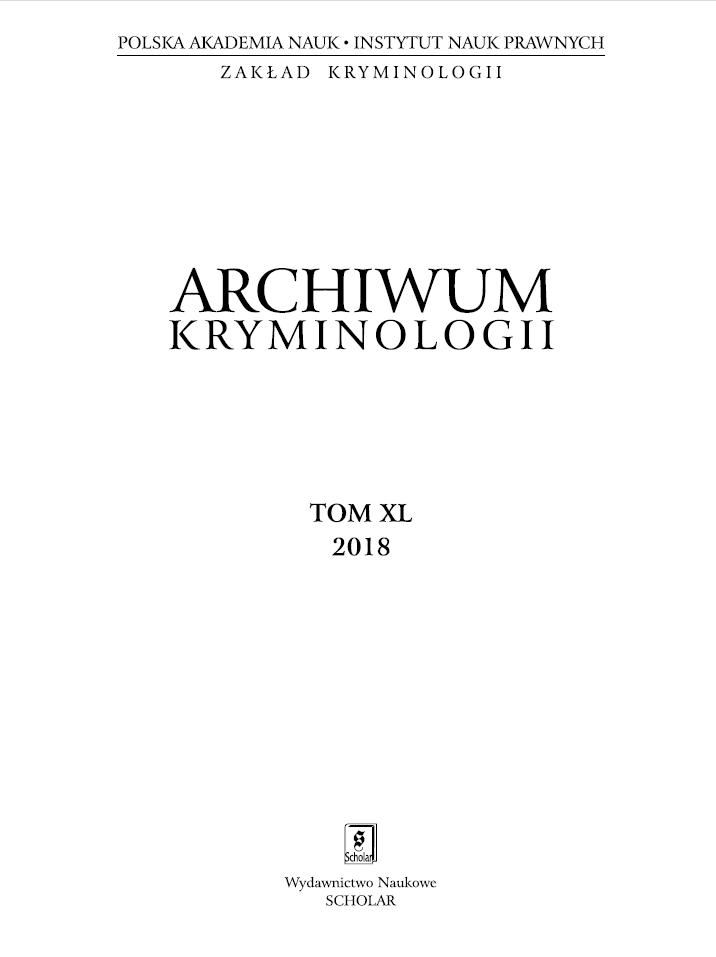Sędziowski wymiar kary w badaniu prawno-socjologicznym 2012–2014
Judiciary Sentencing in Legal and Sociological Research in 2012-2014
Author(s): Jadwiga KrólikowskaSubject(s): Sociology of Law
Published by: Instytut Nauk Prawnych PAN
Keywords: punishment; criminal law; law and sociological research; judges
Summary/Abstract: This article presents selected results of a legal and sociological research project entitled“Penal cultures. Cultural context of criminal policy and criminal law reforms. Legal,penological, historical, sociological, and cultural (anthropological) analysis of criminallaw reforms in Poland against the background of European and world trends”, conductedin 2012-2014 on a sample of 160 Polish judges. The research was carried out usingthe questionnaire method supplemented with in-depth interviews with 12 judges.The questionnaire was sent by email to all the presidents of district, regional, andappellate courts in Poland with a request to pass it to their judges. The questionnaire wasaccompanied by a recommendation letter from the Vice-Rector for Scientific Researchat the University of Warsaw with the information about the research unit, that is aboutthe Professor G. Rejman Division of Culturally Integrated Legal and Social Studiesand the European Centre for Penological Studies at the University of Warsaw. Thequestionnaire was either sent back in bulk from individual courts, or the respondentssent it back individually by post or email to the university address provided.The punishment phenomenon was examined in a processual approach. Theresearchers adopted the hypothesis that criminal judges were the first link in thisprocess and knew more about punishment and punishing as social and legal phenomena than the general public. The presented research refers thematically to the studiescarried out by Bronisław Wróblewski and Witold Świda before World War II, reportedin their book Sędziowski wymiar kary w Rzeczypospolitej Polskiej. Ankieta [The judiciarysentencing of punishment in the Republic of Poland. A Questionnaire], publishedin Vilnius in 1939. Similarly to those studies, the present research asks questions aboutthe determinants of the judiciary dimension of punishment, but it emphasises morestrongly the cultural, philosophical and moral dimensions of punishment attitudesdisplayed in sentencing.The statements of the respondents show a varied l evel of the judges’ knowledge aboutmatters concerning the socio-cultural and psychological aspects of punishment. Theyalso reveal a strong legal orientation of views and remain within the set of notions andtheories focused on law. Similarly to the Vilnius pre-war studies, the judges’ statementsshow a strong formative influence of lawyers’ education curricula implemented at alllevels of education.The results of the research carried out in 2012-2014 illuminate the judges’ viewson the goals and functions of punishment and punishing. They show the declaredhierarchy of the most important variables defining professional decisions regardingthe sentences imposed by the judges. They show the influence of systemic and culturalvariables on the professional attitudes and motives of the judges’ decisions in this matter.The judges’ statements on the effectiveness of penalties in individual and generalprevention are generally subdued. Although these factors are taken into account inthe process of sentencing, there is no deep conviction about their high impact. It issignificant that the research shows a clear distancing of the judges from the assumptionthat they may be subservient to influences from their superiors, scholarly authorities,public opinion or the decisions of colleagues in similar matters. Independence isdeclared by judges to be an important feature of their professional ethos and appliesto all sources of influence. On the other hand, what the judges indicate as variablesrelevant to their decisions on sentencing are the personal and family conditions ofthe perpetrator and their potential for rehabilitation, which may occur as a resultof criminal sentencing and end the state of impunity. The respondents also indicatethat the fairness of a sentence and the doing of justice to the offender is a significantaspect of the court’s action.Although the research procedure in this case was strongly grounded in empiricism,this was not its main distinguishing feature – it was the conducting of research inthe culture of methodological and theoretical integration of the empirical material.It makes it possible to deduce a complex structure of the researched process andto undertake an analysis explaining many more variables than would appear in thedisciplinary mono analysis.
Journal: Archiwum Kryminologii
- Issue Year: 2018
- Issue No: XL
- Page Range: 371-400
- Page Count: 30
- Language: Polish

